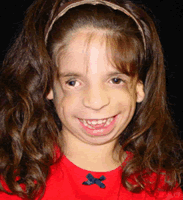Putting Our Life In Another Perspective:
What If You Were Born With TREACHER COLLINS SYNDROME?
How would your life be like? Husband and I were watching the medical information channel on cable tv last weekend when we chanced upon this Treacher Collins Syndrome feature. We never knew it and didn't know such things exi st BUT we really do admire those who have this and continue on to live a normal life~ despite the lifelong struggle and challenges they have to deal with on a daily basis.
st BUT we really do admire those who have this and continue on to live a normal life~ despite the lifelong struggle and challenges they have to deal with on a daily basis.
In the documentary, we learned a lot~ from the heaves of surgeries people with Treacher Collins Syndrome have to go through and the cost of these on-going surgeries survivors have to deal with for most of their life~ if only to make themselves to look "normal." Most of them are very positive about life in general which is quite refereshing to know!
From the documentary, we also learned about AMIE (*not in picture here*), an accomplished lady who made it through medical school in Texas 2years ago. Despite her physical handicap associated with this syndrome, she lives a normal life, has a boyrfriend and is doing well- academically! Now she is doing her residency in pediatric medicine! Isn't that amazing? I am so touched by Amie's story. Will post it later. Meanwhile here are some stuff for you to read on.
TREACHER COLLINS SYNDROME is also called mandibulofacial dysostosis, affects the head and face.Characteristics include:
1. down-slanting eyes
2. notched lower eyelids
3. underdevelopment or absence of cheekbones and the side wall and floor of the eye socket
4. lower jaw is often small and slanting
5. forward fair in the sideburn area
6. underdeveloped, malformed and/or prominent ears
Most children with Treacher Collins have normal development and intelligence; however, it is important that there be early hearing tests. Most children with Treacher Collins Syndrome benefit from early intervention speech and language programs.
Why did this happen?
Treacher Collins Syndrome is believed to be caused by a change in the gene on chromosome 5, which affects facial development. About 40 percent of the time, one parent has the Treacher Collins Syndrome gene. Geneticists can now determine whether the Treacher Collins gene is a new mutation or one that has been passed on.
Will this happen to children I have in the future?
Treacher Collins Syndrome may be inherited from a parent affected with Treacher Collins. There is a 50% change of passing it on if you have it. If may also occur in children of unaffected parents. However, the chances of Treacher Collins occurring again in children of unaffected parents is minute.What kinds of problems could my child have?
In addition to the physical characteristics common to Treacher Collins syndrome, your child may have some or all of the following problems:
1. breathing problems and/or eating difficulties
2. most children have a 40% hearing loss in each ear due to abnormalities of the outer and middle ear, which conduct sound to the nerve endings
3. the eyes have a tendency to dry out, which can lead to infection
4. some children have abnormally small or absent thumbs
5. cleft palate often occurs with Treacher Collins Syndrome
Will my child need surgery?
Depending on the severity of the Treacher Collins, your child may need some or all of the following procedures:
1. a conductive hearing aid
2. correction of the cleft palate
3. repair of the sidewall and floor of the eye socket
4. repair of the cheekbones
5. repair of the eyelid notches
6. correction of the undeveloped jaw and chin
7. surgery to correct the beak-like nose
8. reconstruction of the ears
New advances in the procedures to treat Treacher Collins Syndrome are constantly being developed. Be an advocate for your child!
How do I get help for my child?
Your child should be treated by a qualified craniofacial medical team at a craniofacial center. Currently, FACES has information on thirty-two craniofacial teams located in 20 states, the District of Columbia, and Canada. This is by no means a comprehensive list of all the craniofacial teams. Please contact FACES for details on possible locations closer to you. Am I alone?No! There are many families and organizations who will be glad to talk with you and help you with information and support. Don't forget books, videos, and websites.
The listing below will get you started.
FACES: The National Craniofacial AssociationP. O. Box 11082Chattanooga, TN 37401(800) 332-2373
email: faces@faces-cranio.org
We provide financial support for non-medical expenses to patients traveling to a craniofacial center for treatment. Eligibility is based on financial and medical need. Resources include newsletters, information about craniofacial conditions, and networking opportunities.
Treacher Collins Foundation
Box 683Norwich, VT 05055(800) 823-2055Website: http://www.treachercollinsfnd.orgThis organization provides support, research information, newsletter, and networking opportunities.
Johns Hopkins Center for Craniofacial Development & DisordersWeb site: http://www.hopkinsmedicine.org/craniofacialAt the web site, click on the "Family" button, "Patient Care" button, and go to the section on Treacher Collins syndrome.

No comments:
Post a Comment
Comment: